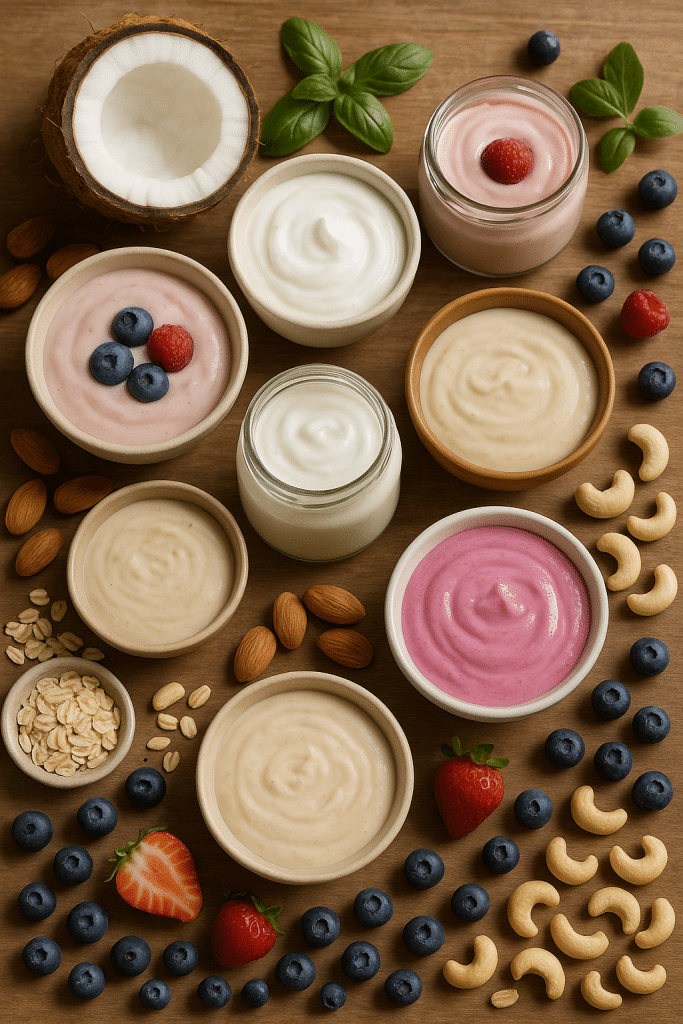Choosing the best dairy free yogurts can feel overwhelming, especially if you’re health-conscious and aiming for balanced nutrition. Whether you’re lactose intolerant, vegan, or just exploring plant-based options, finding a yogurt that offers probiotics, protein, and natural ingredients is crucial. Dairy-free yogurts come in various bases like coconut, almond, oat, and innovative nuts such as pili, each bringing unique benefits.
In this detailed guide, I’ll explore what makes dairy-free yogurts beneficial for gut health, dissect critical nutritional factors to consider, and provide in-depth reviews of seven standout dairy-free yogurt brands I’ve personally examined and researched thoroughly. Plus, I’ll share expert insights on how to incorporate these yogurts into your daily meals while addressing common questions about their nutritional equivalency and use for weight management.
So, whether you want to boost your digestion, cut down on sugar, or simply enjoy a creamy, tasty yogurt without dairy, this comprehensive article will steer you toward an informed choice aligned with your health goals.
Understanding Dairy-Free Yogurt: A Nutritional Overview
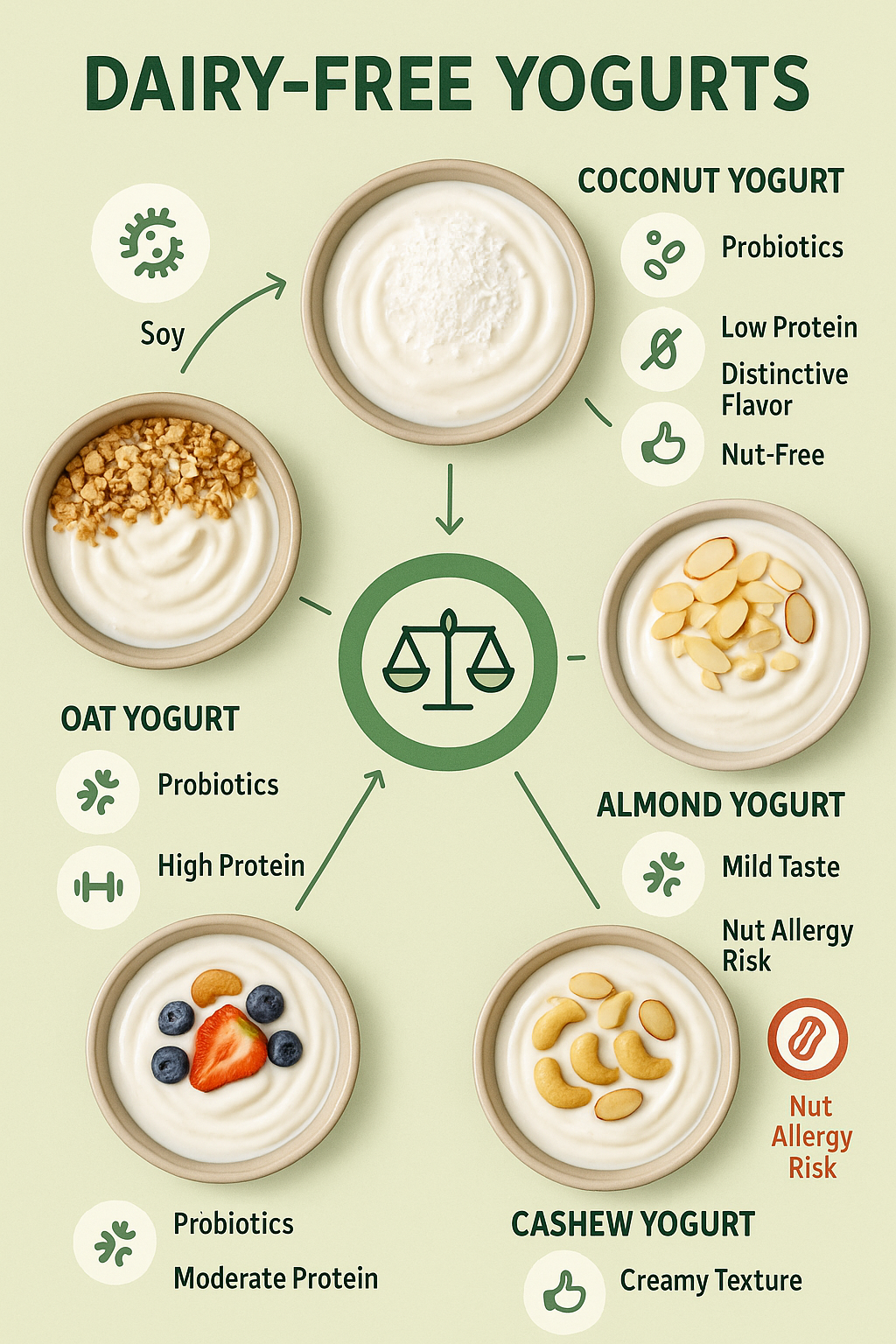
Dairy-free yogurts have carved an important place in modern diets due to rising awareness of lactose intolerance, dairy allergies, and the benefits of plant-based nutrition. But what really sets these alternatives apart nutritionally? Understanding their benefits and the nutrients they offer can help you select options that support your gut health and overall wellbeing.
What Makes Dairy-Free Yogurts Beneficial for Gut Health
One of the biggest draws of yogurt, whether dairy or non-dairy, is its probiotic content—live microorganisms that support a balanced gut microbiome. A healthy gut flora is linked to improved digestion, enhanced immunity, and even better mood regulation.
Dairy-free yogurts from coconut, almond, or oat bases typically have probiotics such as Lactobacillus and Bifidobacterium strains, although the quantity and strains vary by brand. For example, Lavva’s pili nut yogurt boasts an impressive 50 billion live vegan probiotics per serving, offering a potent boost for your digestive tract.
Certain brands also avoid additives like gums and artificial sweeteners that could disrupt gut flora, favoring whole-food fermentation instead—this choice better preserves the natural probiotics, making those yogurts more effective.
Key Nutrients in Plant-Based Yogurt Alternatives
While probiotics get much of the spotlight, a quality dairy-free yogurt should deliver balanced nutrition. Here’s a breakdown of key nutritional components:
-
Protein: Essential for muscle repair and satiety, plant-based yogurts vary widely in protein. Kite Hill’s almond milk Greek yogurt packs 17 grams per serving, rivaling traditional dairy yogurts, while others like Cocojune offer modest protein but focus more on healthy fats.
-
Healthy Fats: Coconut-based yogurts such as Siggi’s Plant-Based Coconut Blend and Cocojune boast higher saturated fats, but mostly from medium-chain triglycerides (MCTs), which may support energy metabolism.
-
Fiber: Oatmilk yogurts like Nancy’s provide added dietary fiber, which assists digestion and promotes fullness.
-
Calcium and Vitamin D: Fortification varies, but many brands, including Silk’s Almondmilk Yogurt Alternative, include these critical nutrients, supporting bone health, especially important in dairy-free diets.
-
Sugar Content: Keeping sugar low is key to balanced nutrition. Lavva’s zero added sugar and Kite Hill’s 0 grams of sugar make them standout choices for those monitoring glucose levels.
Comparing Milk Bases: Coconut, Almond, Oat, Pili Nut, and Soy
Different milk bases influence texture, taste, and nutritional profile:
| Milk Base | Highlights | Protein (per serving) | Notable Benefits |
|————|——————————————————-|—————————————|——————————————-|
| Coconut | Creamy texture, naturally sweet, rich in MCTs | Moderate (varies by brand, ~3-6g) | Supports energy metabolism, gut-friendly fats |
| Almond | Light, nutty flavor, often fortified with nutrients | Moderate to High (6-17g) | Low-calorie, good source of vitamin E |
| Oat | Mildly sweet, thicker consistency, rich in fiber | Moderate (~6g) | High in beta-glucan fiber, heart health |
| Pili Nut | Rare, whole-food based, creamy, zero sugar | Moderate (exact varies, ~5g estimated)| Rich in antioxidants, sustainable nut |
| Soy | Often smooth and creamy, rich protein | High (6-12g) | Complete protein, widely available |
Each base brings its unique advantages, so picking the right one depends on your nutritional needs and flavor preference.
Criteria for Selecting the Best Dairy Free Yogurts
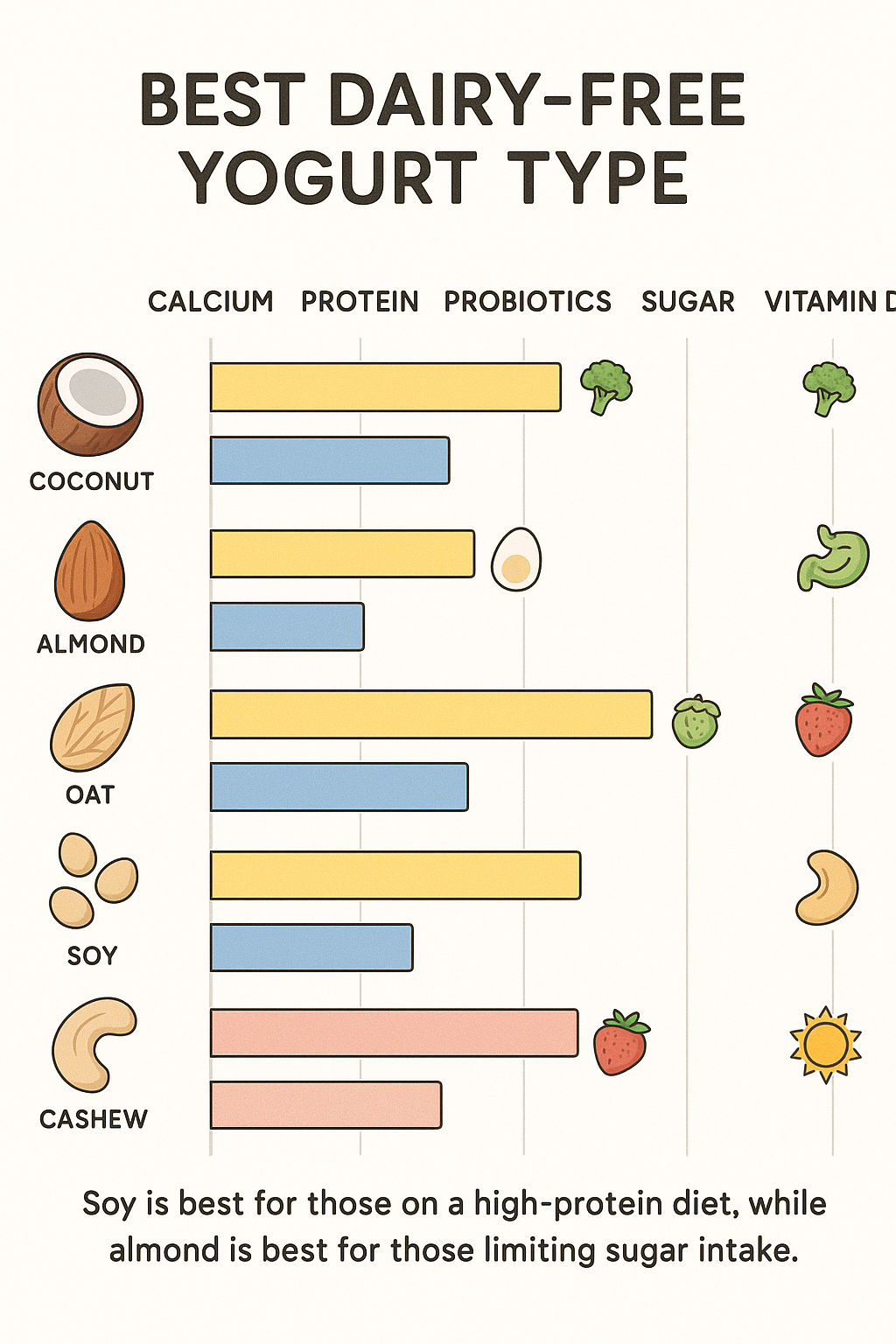
Selecting the best dairy free yogurts requires careful evaluation. Here are the critical criteria I use to assess products:
Evaluating Protein Content and Quality
Protein is a cornerstone of balanced nutrition. Plant-based yogurts vary drastically; for example, Kite Hill’s Greek-style almond yogurt leads with 17 grams of protein per 6-ounce serving, making it a superb choice for those wanting to maintain muscle mass or feel fuller longer.
In comparison, fruit-flavored coconut or pili nut yogurts may provide less protein but compensate with probiotics and healthy fats. Consider your protein needs: if you’re active or recovering from illness, high-protein options like Kite Hill or Silk Almondmilk yogurt are ideal.
Importance of Live Cultures and Probiotics
Look for “live active cultures” or specify probiotic strains like Lactobacillus acidophilus or Bifidobacterium species. Some brands, such as Lavva, advertise billions of live cultures per serving, far exceeding average products. Live probiotics contribute to gut flora diversity and a robust immune system.
Be wary of yogurts using heat-treating processes that kill probiotics after fermentation. Likewise, additives like gums or preservatives can reduce probiotic viability.
Assessing Sugar Levels and Sweetener Types
Sugar content significantly impacts yogurt’s health value. Many dairy-free yogurts contain added cane sugar or fruit concentrates, which may negate probiotic benefits.
Brands like Lavva contain zero added sugar, while Kite Hill Plain Unsweetened yogurt boasts 0 grams of sugar, making them excellent for weight management and blood sugar control. Alternatives with natural sugar from fruit, like Siggi’s raspberry, provide a sweeter taste but usually keep sugar moderated.
Allergy-Friendly and Clean Ingredient Profiles
In addition to being dairy-free, consider allergens like soy, gluten, nuts, or carrageenan. Silk Almondmilk Yogurt Alternative is free from dairy, soy, carrageenan, and artificial flavors, catering to sensitive individuals.
Always opt for organic, Non-GMO, and minimal-ingredient labels when possible, as these reduce exposure to pesticides and additives. Brands like Cocojune pride themselves on certified organic ingredients and sustainable packaging, which adds an ethical dimension to your choice.
In-Depth Reviews of the 7 Best Dairy Free Yogurts
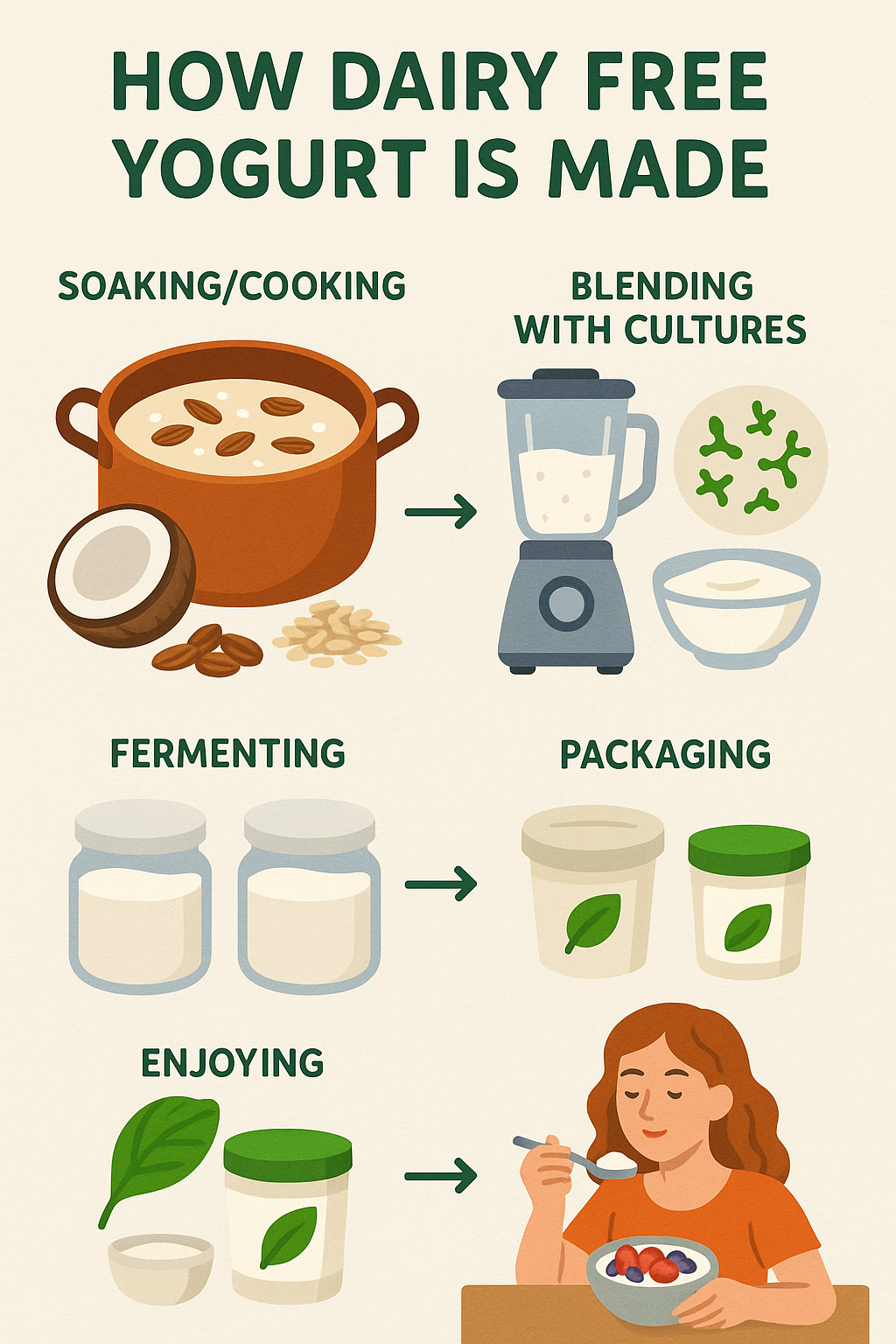
Let’s dive deep into seven exceptional products that stand out in the current market:
Siggi’s Plant-Based Coconut Blend Yogurt: Balanced Protein and Sweetness
Flavor Varieties and Nutritional Highlights
Siggi’s offers an array of flavors such as Raspberry, Mango, Vanilla Cinnamon, and Mixed Berries. Nutrition-wise, it provides about three times more protein and 40% less sugar than leading yogurt alternatives, achieved through its low-sweet coconut blend. It’s free from artificial sweeteners and preservatives, supporting a clean diet.
Availability and Consumer Feedback
You can find Siggi’s on major retailers like Amazon and Kroger. Consumers praise its creamy texture and balanced sweetness. Some note flavor preference varies, so sampling different varieties is wise.
Lavva Original Pili Nut Yogurt: Innovative Whole Food Ingredients with Zero Added Sugar
Probiotic Potency and Natural Composition
Lavva’s pili nut yogurt impresses with 50 billion live vegan probiotics per serving, made from whole pili nuts, coconut, and plantains. Remarkably, it contains no added sugars or gums, listed as Non-GMO Project verified. Its probiotic diversity supports robust gut health.
Purchasing Options and Sustainability Considerations
Buy directly from Lavva’s official site with free nationwide shipping or via Amazon. Lavva is a fantastic choice for those seeking natural composition and sustainability.
GT’s Living Foods Coconut Yogurt: Raw Coconut and Probiotic-Rich Benefits
Flavor Options and Live Culture Profile
GT’s COCOYO range includes Pure, Vanilla, Cacao, Piña Colada, and more, all featuring raw young coconuts fermented with probiotic cultures. This raw approach bolsters probiotic viability and delivers a fresh, tangy taste.
Retail Availability and User Reviews
Purchase through GT’s website or stores like New Leaf Community Markets. Consumers enjoy its freshness and natural ingredients, ideal for raw food enthusiasts.
Silk Almondmilk Yogurt Alternative, Plain: Smooth Texture with Plant-Based Protein
Nutritional Breakdown and Free-From Attributes
Silk Almondmilk yogurt offers 6 grams of protein per serving, fortified with calcium and vitamin D. It’s free from dairy, soy, gluten, carrageenan, casein, and artificial flavors—perfect for many allergy sufferers.
Where to Buy and User Experience
Available on Silk’s website, Amazon, and Target. Those sensitive to common allergens appreciate its smooth texture and versatility.
Cocojune Lemon Elderflower Organic Cultured Coconut: Organic and Flavorful with Probiotics
Organic Ingredients and Sustainability Efforts
Cocojune blends organic coconuts, elderflower, and lemon oil with vegan probiotics. It’s USDA Organic and uses paper-based cup packaging, supporting net-zero plastic initiatives—great for eco-conscious buyers.
Nutritional Information and Retail Channels
Each 4 oz cup contains 190 calories, 16g fat, 10g carbs, and 1g protein. Available from Cocojune’s official site, Target, and FreshDirect. Fans note the refreshing lemon-elderflower flavor.
Nancy’s Oatmilk Plain Non-Dairy Yogurt: High Fiber and Probiotic Support
Allergy-Friendly Formulation and Environmental Impact
Nancy’s oatmilk yogurt boasts 6 grams of protein, billions of probiotics, and is free from dairy, soy, gluten, and nuts. Oat cultivation is water-efficient, reducing environmental impact.
Availability Across Retailers and Delivery Services
Find it at Green Way Markets, Acme Markets, and via delivery apps like Uber Eats and DoorDash, making it accessible for various lifestyles.
Kite Hill Plain Unsweetened Artisan Almond Milk Greek Yogurt: Protein-Packed Greek Style Option
Probiotic Content and Sugar-Free Benefits
Kite Hill stands out with a whopping 17 grams of plant-based protein and zero sugar per 16 oz serving. It includes live cultures, supporting digestion without unnecessary additives.
Usage Suggestions and Purchasing Locations
Purchase on Kite Hill’s website or Kroger. Use in smoothies, overnight oats, or creamy dips for a protein boost.
Unique Insights: The Role of Texture and Taste in Long-Term Dietary Adoption
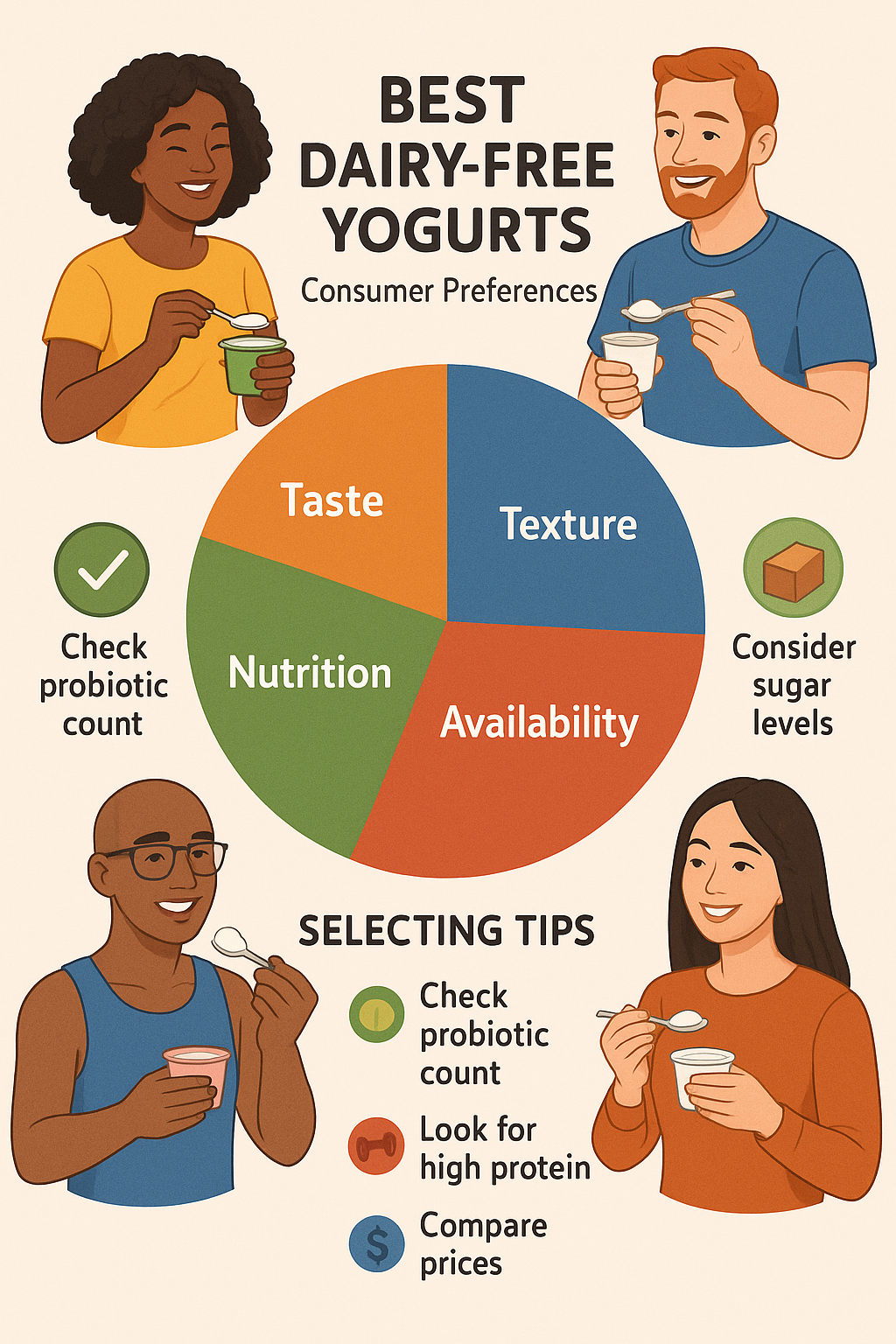
How Creaminess Influences Consumer Preference and Nutritional Satisfaction
Creaminess is not just a mouthfeel—it affects how satisfying a yogurt is. Brands using coconut or pili nut bases often have richer textures, which can help curb cravings for sugary snacks. Meanwhile, almond and oat-based yogurts offer lighter textures that work well in smoothies or with granola.
Yogurts that balance tartness and sweetness, like Siggi’s or Cocojune’s Lemon Elderflower, make the experience enjoyable enough to maintain consistent consumption, which is key for sustained probiotic benefits.
Strategies for Incorporating Dairy-Free Yogurts into Balanced Meal Plans
To maximize benefits, integrate these yogurts thoughtfully:
- Breakfast: Combine with fresh fruit, nuts, and seeds for a nutrient-dense start.
- Snacks: Use plain yogurts with a drizzle of honey or cinnamon for added flavor without excess sugar.
- Cooking: Substitute dairy yogurt in savory sauces and dips with Kite Hill or Silk almond versions.
- Desserts: Blend frozen plant-based yogurt with berries for a refreshing mousse.
This approach fosters diverse nutrient intake and keeps meals exciting.
Addressing Common Questions About Dairy Free Yogurts
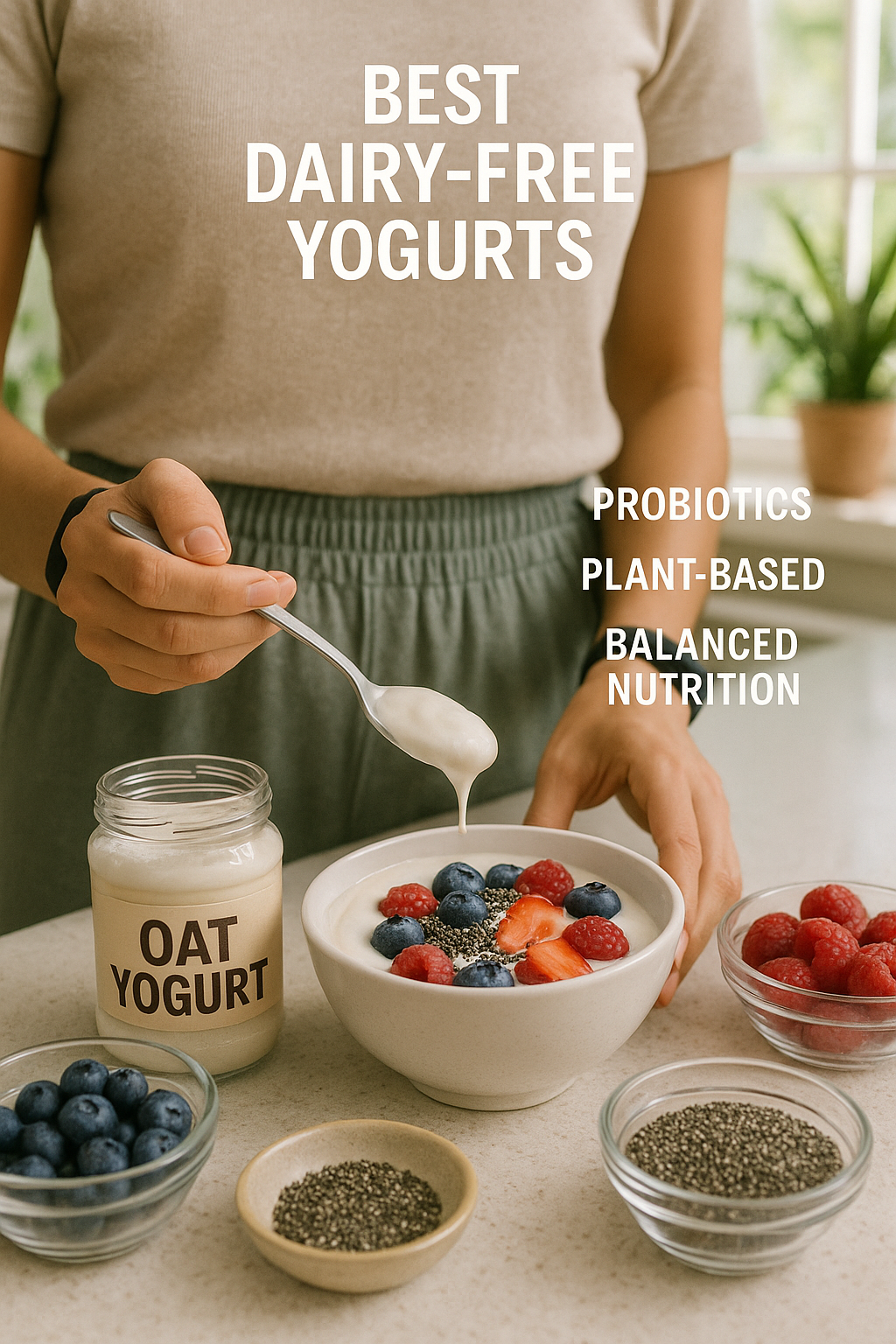
Can Dairy Free Yogurts Fully Replace Dairy in Nutritional Value?
While many dairy-free yogurts offer comparable probiotics and protein (especially Greek-style ones), some may lack specific nutrients like calcium unless fortified. Choosing fortified versions and balancing with other dietary sources can ensure equivalency.
What to Look for in Dairy Free Yogurts for Weight Management?
Focus on yogurts low in added sugars and rich in protein and fiber, such as Lavva (zero added sugar) or Kite Hill (high protein, low sugar). These promote fullness and steady energy release.
How to Identify Truly Probiotic and Low Sugar Options?
Look for explicit probiotic strain listings and live culture declarations. Check labels for sugar content and added sweeteners; aim for plain or unsweetened varieties. Brands like Lavva and Nancy’s Oatmilk are good examples.
Quick Takeaways/Key Points
- Dairy-free yogurts vary in protein, probiotics, texture, and taste based on their base ingredients.
- Probiotics support digestive health and immunity; high-potency yogurts like Lavva offer substantial probiotic counts.
- Sugar content is a critical factor—seek unsweetened or low-sugar options like Kite Hill and Lavva.
- Allergens and additives matter—brands such as Silk and Nancy’s cater to allergy-sensitive individuals.
- Texture influences satisfaction and long-term adherence; coconut and pili nut yogurts provide creaminess, while almond and oat offer lighter options.
- Integrating plant-based yogurts into meals enhances balanced nutrition and supports gut health.
- Fortified plant-based yogurts help substitute dairy nutrients like calcium and vitamin D.
Conclusion: Making an Informed Choice for Dairy-Free Yogurt Consumption
Selecting the best dairy free yogurts isn’t just about avoiding dairy—it’s about embracing balanced nutrition that supports your health goals, gut health, and lifestyle preferences. As we’ve explored, options like Siggi’s Plant-Based Coconut Blend and Kite Hill’s Greek-style almond yogurt provide substantial protein and probiotics, while Lavva’s pili nut yogurt highlights a groundbreaking whole-food approach with zero added sugar and massive probiotic counts. For those prioritizing organic and sustainable choices, Cocojune’s Lemon Elderflower is a delightful option, delivering both flavor and environmental responsibility.
When choosing your ideal yogurt, consider your dietary needs: prioritize protein, live cultures, and minimal sugar. Don’t hesitate to try multiple brands and flavors—variety keeps your diet exciting and nutritionally comprehensive.
Ready to elevate your dairy-free regimen? Explore these exceptional options, incorporate them into your meals creatively, and watch your gut health and overall nutrition thrive. Here’s to flavorful, wholesome, and responsible dairy-free yogurt choices that fit your life perfectly!
FAQs about Best Dairy Free Yogurts
Q1: What are the best dairy free yogurts for probiotics?
A: Brands like Lavva Original Pili Nut Yogurt and GT’s Living Foods Coconut Yogurt stand out for high probiotic counts, containing billions of live cultures that support gut flora diversity.
Q2: Which dairy free yogurts have the highest protein content?
A: Kite Hill Plain Unsweetened Artisan Almond Milk Greek Yogurt offers up to 17 grams of protein per serving, ideal for those needing a protein boost comparable to traditional Greek yogurt.
Q3: Are there affordable dairy free yogurt brands with good nutrition?
A: Silk Almondmilk Yogurt Alternative is widely available, affordable, and provides a balanced nutrient profile without common allergens, making it a practical choice.
Q4: Can I find organic dairy free yogurts with live cultures?
A: Yes, Cocojune Lemon Elderflower Organic Cultured Coconut Yogurt is USDA organic certified and packed with live probiotics, offering an organic, flavorful choice.
Q5: What should I consider when looking for unsweetened dairy free yogurt alternatives?
A: Focus on plain versions that state 0 grams added sugar, check for live probiotics, and ensure they have adequate protein and clean ingredient lists. Lavva and Kite Hill’s unsweetened options are excellent examples.

